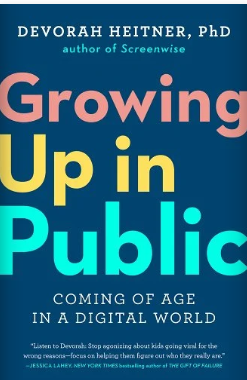






Growing Up in Public
Obviously, technology that didn’t exist when most of us were kids is now an everyday part of childhood. That’s why we devoured “Growing Up in Public,” the brand new book by Devorah Heitner.
Readable and engaging, it looks at everything from selfies to sexting. But for us at Let Grow, its most important insights have to do with the ever-expanding adult supervision of kids. We caught up with Devorah for this Q&A. Contents have been edited for length and clarity:
LG: Devorah, Is everybody tracking their kids?
DH: I interviewed a professor at the University of North Carolina and she said college students’ parents are still tracking them.
LG: Wow! Well, how do you feel about Life360-ing, say, an 8-year-old?
DH: You’re accustoming them to being tracked.
LG: What if you just want to keep them safe?
DH: Do you want to communicate that level of vulnerability to them? That they are so unsafe, that they need to be tracked?
Tracking undermines problem-solving.
LG: I think the availability of tracking sort of reverse-engineers our confidence in our kids and communities, making us feel that we MUST track our kids. But before tracking existed, we learned to trust them in the exact same situations – like walking to school – on their own.
DH: The reality is your kid is safer if they know how to yell for help and recognize a difficult situation. But if we’re always tracking them, they will be very reliant on us. You want them to know how to talk to strangers. You want the 8-year-old to say, “My little brother fell! Can I use your phone?”
LG: In other words, we want them to not automatically outsource all their problems to us. Yes! How do the kids themselves feel about being tracked?
DH: Some tell me they feel safer. They say, “I like it and I like tracking my parents right back.” They say it decreases the checking-in and nagging. But others feel resentful.
Tracking makes it hard for kids to prove themselves.
LG: It strikes me as sad that kids who are tracked can’t prove to their parents that they’re trustworthy. After all: Are you, the kid, not going to the beach because you promised you wouldn’t? Or only because your parents can see where you are? There’s no way to prove you are actually responsible!
So, let’s talk about the opposite of tracking: Uncertainty – that uncomfortable feeling of just NOT knowing everything everywhere all at once.
DH: I think we need to practice living with uncertainty. [To that end,] don’t get your kid their first phone because you were five minutes late picking them up once. Let them know that you’re human and sometimes there’s going to be traffic.
LG: You mean, MAKE our kids experience uncertainty? For its own sake?
DH: Kids can tolerate more than we can imagine. I waited around for my parents all the time. If it was really extreme I’d borrow a quarter to call. We want them to have multiple strategies.
LG: In other words: When they CAN’T reach us immediately, they improvise. That’s very Let Grow. Now let’s talk about another kind of tracking: Class Dojo.
Tracking school behavior is a big deal.
DH: Class Dojo is used in a bunch of elementary schools. It’s an app that parents can see. Teachers can use it for all different kinds of communication, but one is an adaptation of the behavior charts in the front of the room.
LG: It gives parents behavior updates on their kids.
DH: So potentially, a parent could see throughout the day their kid getting pinged for not raising their hand, or getting water without permission.
LG: The kids who fidget must really feel under the gun.
DH: What I heard also is that even the most self-regulated and compliant kids are getting more anxious about school. Even the ones who get only positive points will come home and say, “David turned in his homework and got an extra point, but I did, too, and DIDN’T get an extra point.”
LG: How is this different from old-time in-school discipline?
DH: It makes school a place you never escape. And for parents, it’s incredibly stressful. What am I even supposed to do with the information that he sharpened his pencil without permission?
Phones in schools.
LG: What about having phones in school? Are you against it?
DH: Kids having phones in schools is a given for most middle and high school students. My kid was told to take a picture of his locker combination. How would you take a picture if you weren’t carrying around your phone?
LG: What age are kids bringing phones to school?
DH: In elementary school you’re still seeing the [Gizmo-type] watches. In 4th or 5th, they have phones. The reality is: A lot of kids are checking their phones [throughout the school day].
LG: What do teachers say?
DH: They find it incredibly hard to teach. It’s hard to be as interesting as TikTok.
LG: What advice would you give parents, regarding phones?
DH: It depends on kids’ levels of independence. I don’t think walking three blocks to school [requires a phone]. But if they’re going across town to pick up a sibling, it might be important.
*
Devorah’s book is available here.
If you’d like to think about waiting to give your child a phone, the site Wait Until 8th has great resources.
And if you’d like your child to have some free time after school when their friends are available to play and aren’t on their phones, consider asking your school to start a Let Grow Play Club. The school stays open for mixed-age, loose-parts, no-devices free play.




Wow, I don’t feel alone after reading this.
I’m 24 and I moved out of New York at 19 to attend college. My dad tracked me on Google. Mom texted me every day. They still do so whenever they please. I felt very chained, and I felt anxious to do something risky like to check out my favorite bar late at night by myself when I was of age. but I did anyway and had a great time!
I still have my anxiety but since I moved, I have become very independent doing everything on my own, shopping, laundry, doctors’ appointments, cleaning, taking control of duties, yet because I was very sheltered and indoors, I still spend a lot of my free time in front of a screen on YouTube watching other people have a good time, digital drawing, gaming, and writing stories. My routines seemed to be a never-ending cycle that was difficult to break, to unplug from, and have fun on my own terms stepping out of the norm.
It’s exhausting to still have a mind that second guesses actions that takes me out of that environment- I’m an adult now, I shouldn’t!!! Ugh, it feels like a curse that I’m trying to fight.
Now working for a high school in the tech field, I enjoy my workflow and problem-solving. The staff looks after me and I get along with the kids just fine where they show comfort to address any issues with me or even chat. That alone feels great.
Still, I’m trying to balance my life, to not get too comfortable at home and too tired to do anything else than what I’m used to or cash out for the weekend- I want to experience more, interact with new people, go to new places. Do things by myself, find inspiration on my own, though I’m conflicted after watching the news and getting too cozy with my rituals.
I have wings but they’re still heavy.
I admire the kids today who are fearless to tackle whatever they want. I just hope they are doing it safely and with consideration. From what I’ve read, too much freedom can make a kid go missing or get in trouble, but too little can make them feel alone and trapped. We need to seek that balance for ourselves and for our kids.
Growing up in NYC I had the advantage of a professional mother (to me and my four siblings and our almost 200 foster brothers and sisters). One reason I am eternally glad we (my wife daughters and I) moved to Alaska almost 60 years ago is that my mother never knew what I was doing (getting mauled by a brown bear, buried in an avalanche, wearing out great airplanes, etc.) until it was past history. Being on the brink of disaster has always been preferable to boredom. I realized, at a very young age that fear was an infringement of my freedom therefore it was not going to govern my life.
I am sure my mother realized that I valued freedom above safety. She didn’t impose discipline to control my behavior, she taught my siblings and me to use discipline to control our own behavior. She didn’t try to tell us where to go but how to decide where we wanted to go and get there.
We were not taught how to live, but to determine how we wanted to live and do it.
When I read, even some of the Let Grow stuff, it looks more like living in minimum security prison compared to maximum security than living in freedom. Freedom to a chicken is a fenced yard rather than a coop. When I read what is called Let Live the image I see is often Bonsai.
This the first I heard of “tracking”. Me neither Cary. https://www.youtube.com/watch?v=BUVvyTqncNM
>it decreases the checking-in and nagging.” I figured that’s what tracking is. So what is it? How “track” without “checking-in.” This sounds like 1984. Tracking, period, scares me. I literally cannot imagine tracking without end. How can parents have lives not tethered endlessly to their kids, to one another? Who has time for this? AND, their own life. I camped, kayaked, backpacked with no phone. Went biking for hours with my younger brother in the Everglades. I’m heartbroken for the kids whose parents may have to work too much or may not be able to afford the equipment to “track.” Kids bound to wonder if their parents just don’t love them enough. Or haven’t the competence to be proper parents. I don’t get why schools allow kids to have their phones out in class. I didn’t allow any gizmos as a substitute long ago. Let Grow can have “no devices” play clubs after school, but schools can’t ban their use in class? I’m aghast at these class behavior charts. Every little thing documented, dictated? Do we want to raise deadened souls?
I’ve been hearing about this book, so thanks for giving us a taste from a Let Grow perspective. And I hadn’t heard about Wait Until 8th, so this ended up being a very worthwhile post for me. Thanks again!
I’ll never get used to this kind of stuff. When I was a kid in the ’60s my family owned one telephone, and it was bolted to the kitchen wall. I left to walk or bike to school at 7:45 and got home between 3:30 and 4:00, without any parental contact all day. Then I went outside to play in the yard, street, vacant lots, park, school field, trees, creek, or wherever I wanted as long as I was home by dark–no adults involved. When I drive the residential streets of my town now and there’s not a kid in sight–as if they don’t exist–it’s kind of depressing. I imagine these same streets and yards fifty, sixty, or seventy years ago, teeming with playing kids the way it was when I was a child. Yeah, I know, I’m a tiresome old fart going on about the old days. So sue me.